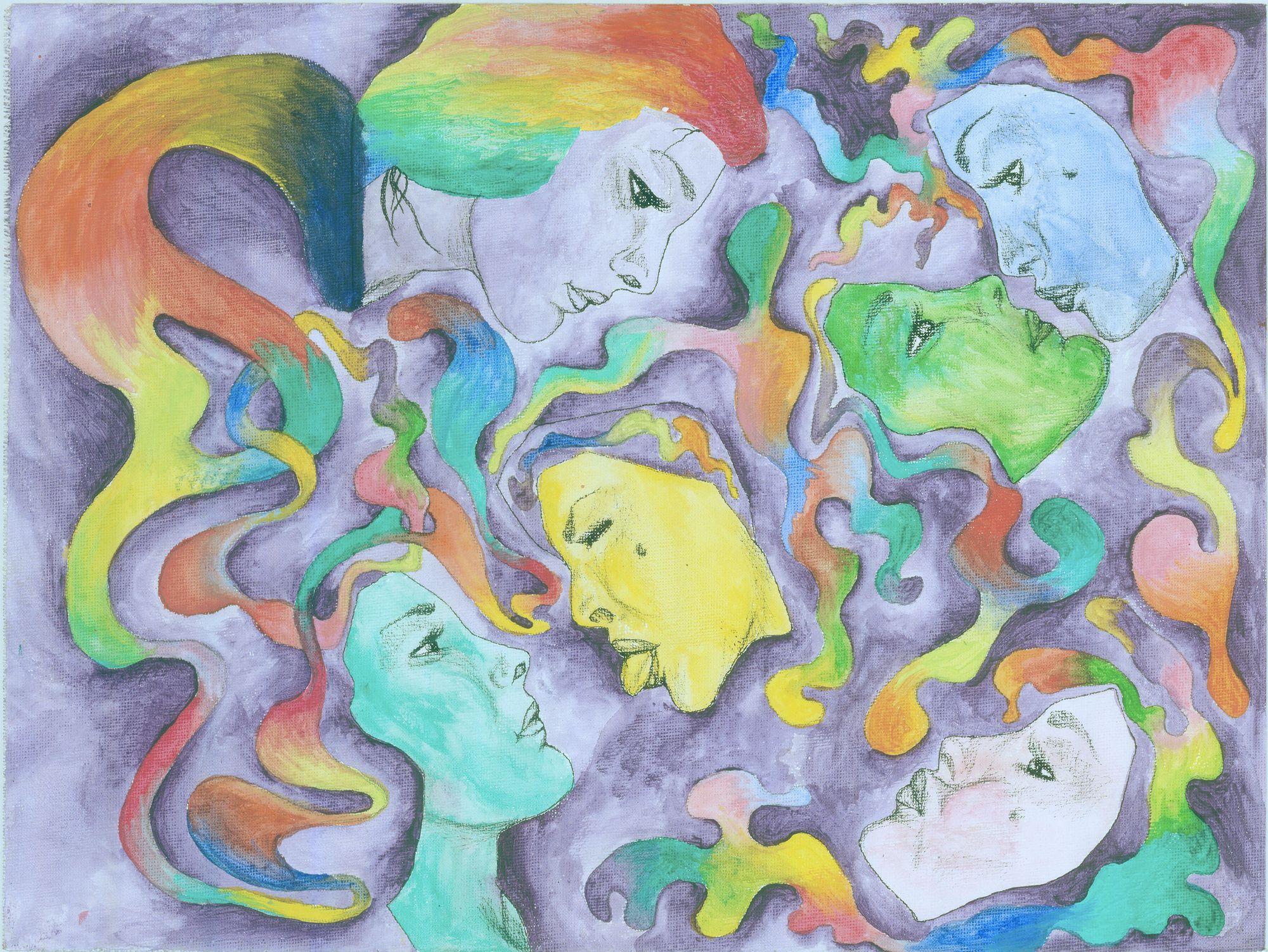“I think I may be a lesbian.” This is what I told my soon-to-be husband a few weeks before we married. His reply was kind, thoughtful, and reassuring: “It’s okay if you are — we’ll get through it.”
I was a teen mom who had moved out of my parents’ house the day I turned 18, signing a lease with my fiancé while I was seven months pregnant. We adopted a cat, the child was born, and a few months later, he proposed and I said yes. Why not? I had what was going to be an ideal life: a human who loved me deeply, a wonderful beautiful child, secure housing, a high school degree, and independence. At 18, it seemed the smart choice. But that thought nagged at me… I might be a lesbian. It’s okay… we’ll get through it. As if it was something to endure in order to live a good life.
I was no stranger to the LGBTQ community. I had long been an out and proud bisexual woman. I phone banked for Referendum 74, spearheaded the first Day of Silence at Hanford High School (which I got in-school suspension for), and attended the local Pride celebrations. I was an enthusiastic ally. In my personal life, most of my male relationships in high school failed quickly and spectacularly, and every woman broke my heart (I still think of you, sometimes, Amy). My husband was different — persistent, loving, accepting. My being a lesbian was something we could overcome because it was something to endure.
On the other hand, I was a frequent consumer of television media. I watched Will & Grace — the gay men on the show had standards of behavior they were held to. I watched Friends — the lesbians on that show were only jokes who were there as punchlines to further the story of the straight characters. Even RENT, the first piece of real LGBTQ media I could get my hands on, had the heroes as bisexuals and the lesbian women were mocked.
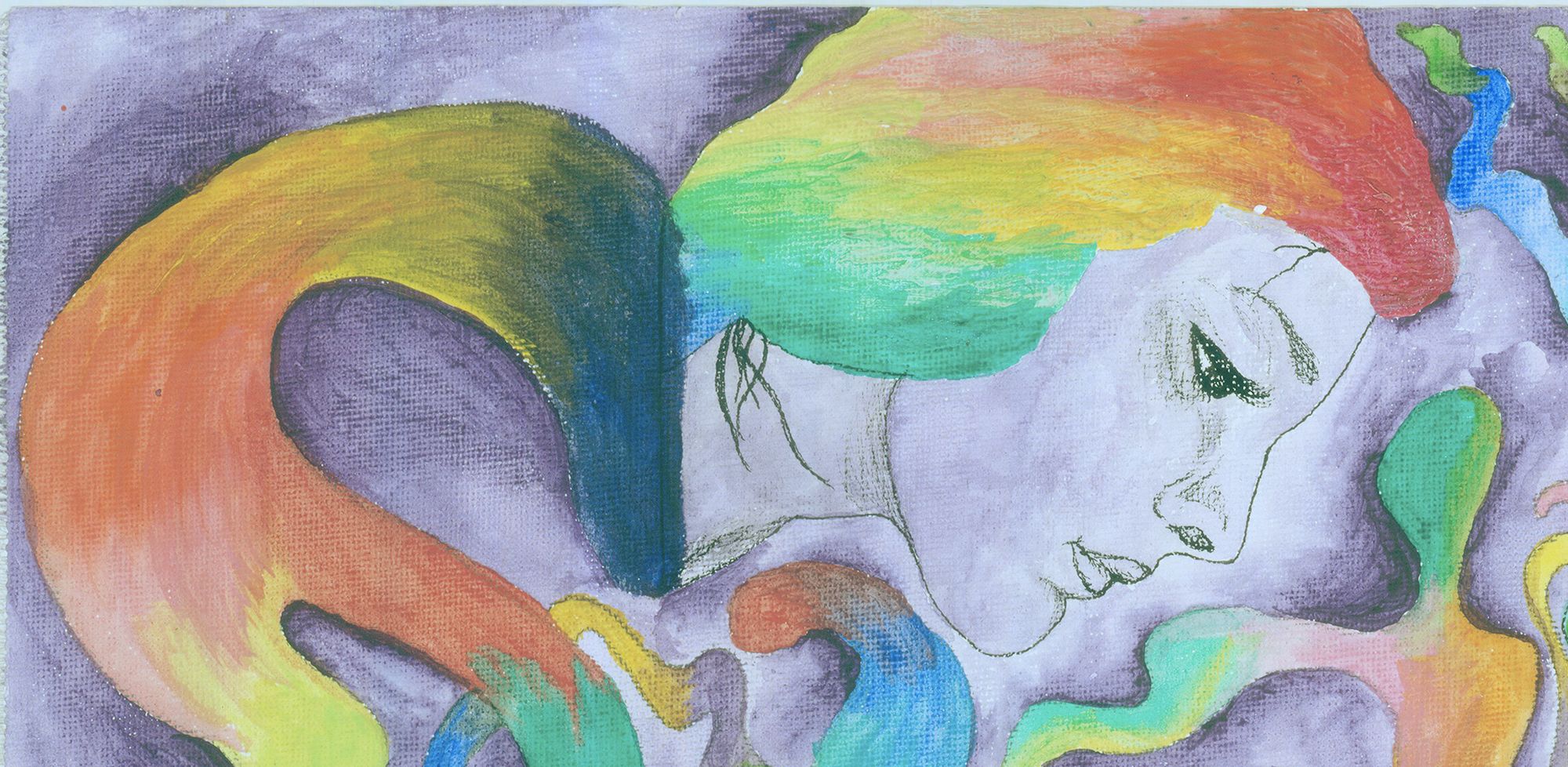
As the years ticked by, my marriage continued to suffer. Not due to lack of love, of which there was plenty, but because I was constantly seeking. What is next? What is better? I climbed the corporate ladder and was knocked back frequently. I went back to school, throwing myself into my work. Anything I could find to avoid acknowledging the fundamental problem in our relationship — the base level of incompatibility that neither of us wanted to admit.
You see, everyone has a blind spot. For me, my blind spot was compulsory heterosexuality. “But that doesn’t apply to you! You’re proudly bi!” Yes, I was. I was a bi woman in the safety of a straight relationship, seeking the protection of heteronormativity. Being gay or a lesbian was not an option. It wasn’t a possibility. How could I be a lesbian? I’m married! I have a kid! I’m happy where we are. I just hate cuddling, sex, myself…. These things, I thought, were normal. The world I grew up in was littered with boomer comics about hating your spouse and how sex stops when you’re married. It was normal. It could be endured.
With compulsory heterosexuality, straight is the norm. Maybe spicy straight, or bisexual-ish, or some interest in threesomes (FFM, obviously), because that’s what’s exciting and allowed. But the standard — the standard for everyone — is to find a good opposite sex partner and settle down. For me, with the added intersection of feminism on top of that, and the drive toward the anti-sexualization of women, I began to feel extremely guilty for my long, lingering glances at women on buses. I stopped watching the Victoria’s Secret fashion show and Miss America pageants — it was disgusting how they treated women. It was disgusting that I enjoyed watching it. Me, in my completely secure bisexual identity in a hetero-presenting marriage.
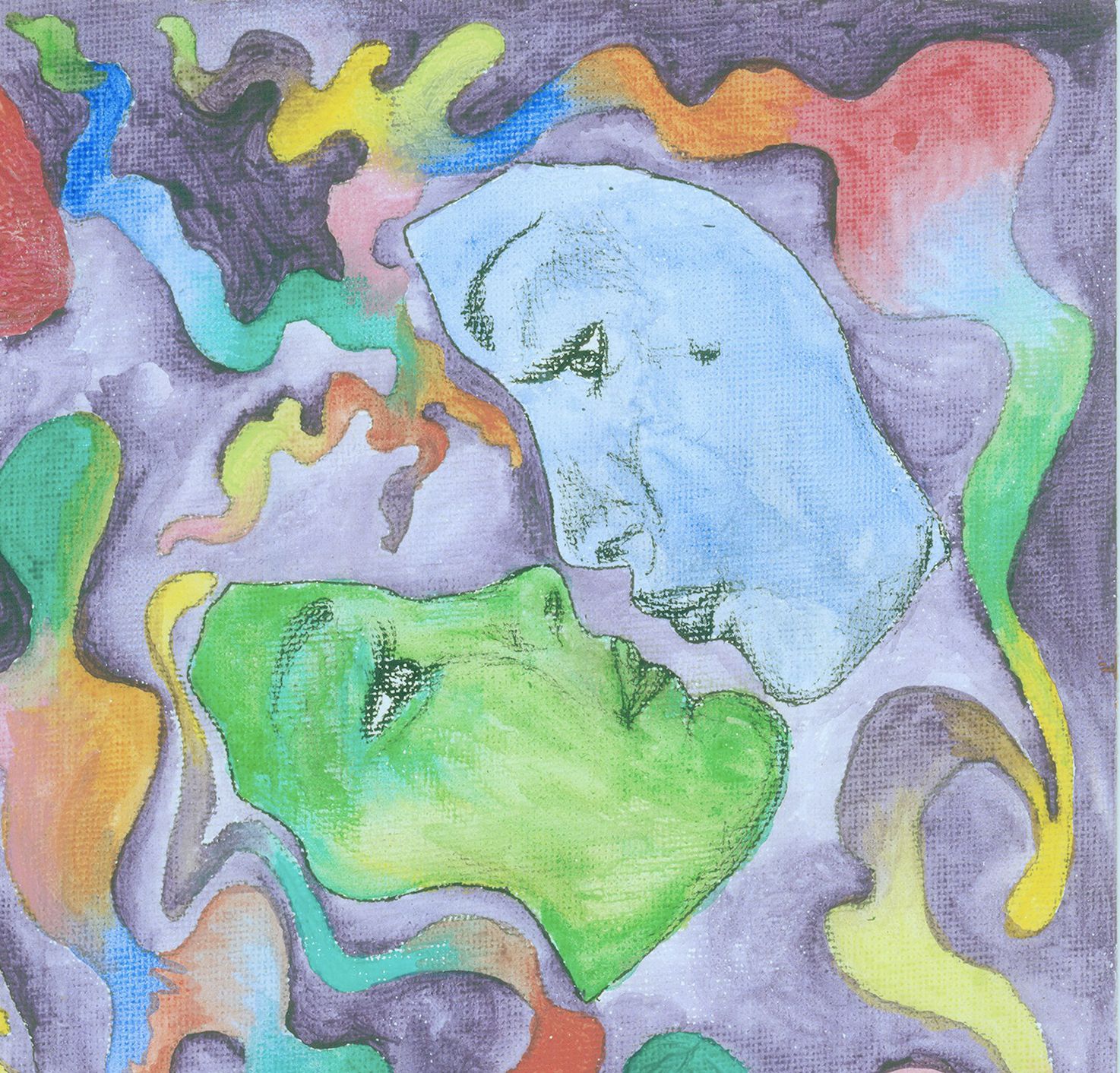
The self-hatred began coming in waves… incredibly strong ones. When it was bad enough and I couldn’t sleep, I would wonder how anyone could love me. I would find myself planning my suicide, trying to figure out where I could leave my body so as not to cause too much trauma to the person who found it. I considered jumping from bridges, hitting a pole on the highway, and every other option I could think of. I would always stop short of executing the plans, remembering all of the terrible ways to exist between living and dead — what if I became maimed, or unable to live independently, trapped inside my own body with only my consciousness to keep me company?
And so I endured. For five years. Then a decade. Then a decade and a half. Every few years, I’d break down into tears, once again uttering those words… I’m afraid I’m a lesbian. Choruses of voices would come back, from my husband to my best friend, always the same responses — It’s okay. You can endure.
Until I couldn’t anymore. I had to know.
My husband and I had often discussed what it would look like if we decided to open up our relationship. It was typically a tense conversation, and had the same overtures of the rest of our deep talks: me feeling lost, trapped, and confused; him feeling loss, concern, and fear of the future. Eventually, we (or more likely, just I) thought it was finally the right time to pursue ‘opening’ our marriage, despite the clusterfuck just beneath the surface. I wanted to take this chance. A chance to see if I really was a lesbian, or just a bored wife, simply no longer in love with the person I had standing by my side all these years. It’s a fool’s choice, really. Looking back, there was no need to experiment this way, in a way that caused such hurt to someone I cared deeply about. There is no science to sexual orientations, no amount of experimentation that will tell you once and for all, “Yes, you are gay.”
I was starting to come to terms with the fact that I constantly felt like I had to decide between my own happiness and his. From the start of our lives, no matter how we’re raised, women are taught that we shouldn’t rock the boat. We should be quiet. We should be content. We should sacrifice ourselves for the good of those around us. This time, I decided to choose myself, and took his reluctant acceptance as an okay to proceed. I quickly found a date… he did not. I got cold feet and ghosted my date.
By pure chance, my husband met a wonderful person at an event the three of us were attending. They had been an old childhood friend of mine, and I could see the affection starting to show in my husband's eyes. I was thrilled, an emotion I’ve since learned is called compersion and is common in the polyamory world. My husband fell in love with them, but they didn’t feel as deeply for him as he did for them. As I got to know my meta (my partner’s partner), I found myself enjoying our time together more and more. I broached the topic of asking them on a date and received resounding yeses from my husband and his partner.
I fell in love with them quickly, just as he had. They fell in love with me as well. Just me. The relationship between my husband and his partner became tense. My relationship with my husband became more tense, too — all of our fears becoming more magnified as my relationship with this other person grew deeper and deeper. The world felt like it was upending. I was split in two — one compartment of my life was completely calm, stable, and full of love and understanding. It was there I was able to build an identity as an LGBTQ+ woman. The other compartment (my ‘real life’) was filled with tension and unease. Three years went by like this. I don’t know how our mutual partner didn’t kick us to the curb like a dumpster fire early on. Eventually, though, they of course had enough of the massive roller coaster that was our marriage. They got off the ride. I didn’t get out of bed for nearly a week.
My husband was sad, but I was destroyed. This was another data point for me, another entry in the experiment log. I thought I was sad about being dumped. I was, but it was so much deeper than that. I was terrified this was the end of our open relationship. No other choices, no other chances, no other way forward but to continue in this marriage. Only us, only together. Enduring.
I scraped together some form of strength and reached out to my former partner after a few weeks of reflection. We talked, and talked, and talked. The catalyst for the breakup isn’t my story to tell, but what I do know is that we repaired what we had and began developing a new relationship. One that only involved them and myself, while I continued to try to repair my own marriage in my own way. My partner helped me to find the strength to finally sit down with my husband and tell him, with a certainty that made it feel like the first time: “I am a lesbian.”
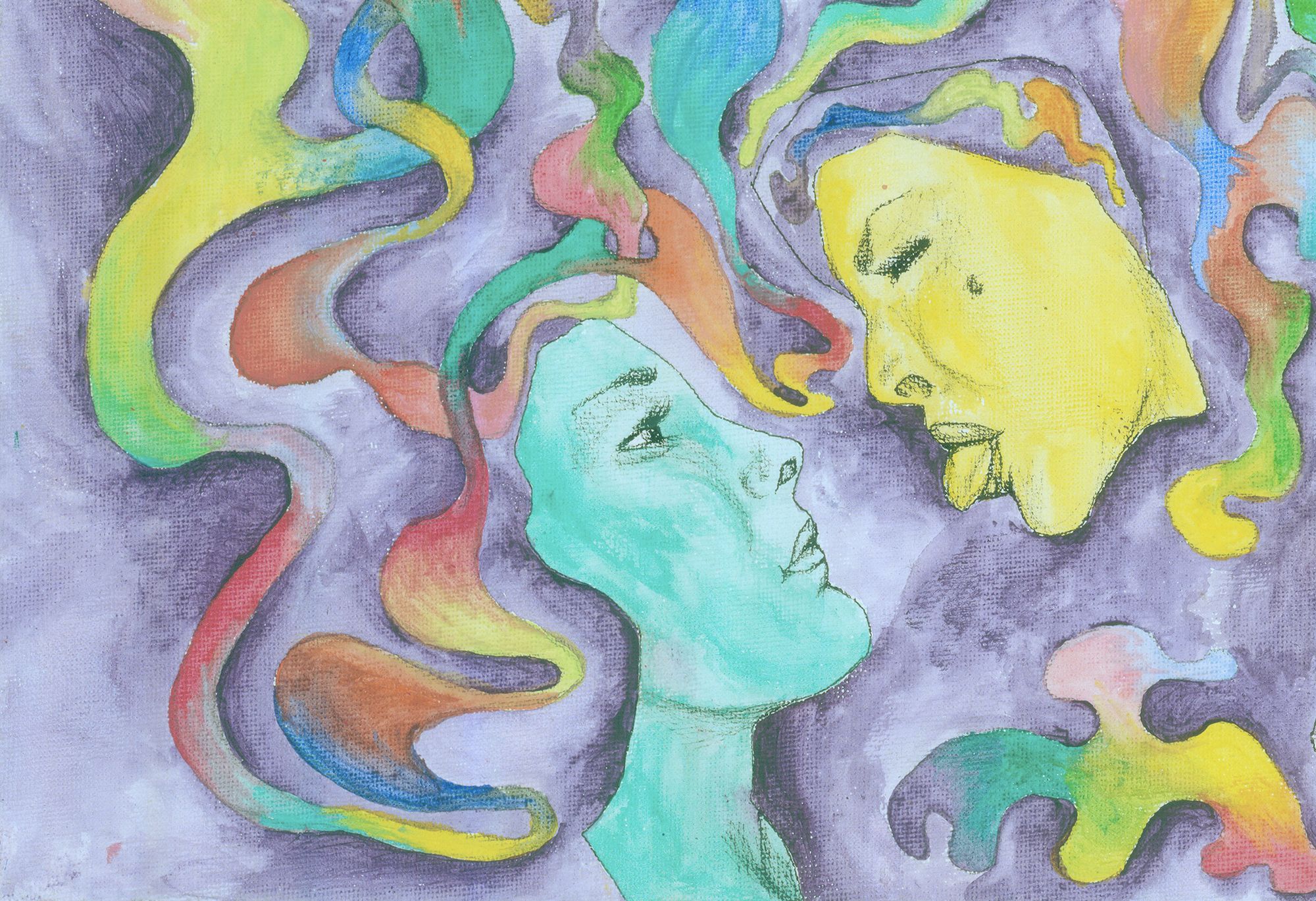
“It’s okay,” he said. “We can work through this.” The words broke me. We couldn’t work through this — I knew it in my heart. But yet again, I felt myself sinking into a position where my happiness was second to the happiness of others. I had to keep the family unit together. I couldn’t breathe, I couldn’t think. Three months I spent spiraling into depression, while my husband and I talked about what our relationship could be. I booked an Airbnb, the first one I could find, and ran off for a week to an isolated apartment somewhere in Idaho. I worked remotely. I spent hours in the bath. I ate an entire cake. I grilled myself a steak. I thought about what my life would be like alone.
I felt some pressure release. I came home, and we eventually talked about what was next.
Marriage counseling started. My husband laid on the table that this was a poly relationship he was okay with continuing, so the therapist approached things from that angle. Inside my mind, however, the suicidal ideation hadn’t stopped. I could compartmentalize — Sure, let’s spend that money to get a nice dining room table (it won’t matter because I’ll be dead and gone soon). Yes, let’s work on improving the yard (I won’t be here to see it). If I was only going to be around for a few months, I could endure anything. If I had years to live, though… I couldn’t do it anymore.
I said the words again just before Christmas: “I am a lesbian.” All I got was the same placating reply. I went to my best friend and tried again: “I’m a lesbian.” “I know,” he said. “You’ve told me.” After talking to more of my friends, I learned that every time I had been tipsy for the last three years, I’d come out to someone new.
I moved into our spare room on Christmas Eve. (Speaking from experience, buying a bed at Costco on Christmas Eve gets you weird looks, but not nearly so weird as when you cry on the floor of Bed Bath & Beyond). Our relationship was to become companionate — we would stay together, raise a child together, but no longer be in a marriage. It was a step. I began journaling. My therapist expressed pride but remained concerned that I continued to put myself last.
COVID finally hit, and I was rewarded with a case of long haul COVID. I saw specialist after specialist, until finally one of them put me on a nerve suppressant of some kind. Unfortunately, this had the unintended affect of turning my slight suicidal ideations into something more active. The planning began again in earnest; I realized this was the end and I couldn’t do it anymore. I was ready. I reasoned that I was already destroying lives while being an alive lesbian, so at least a dead wife would be a solid ending. I called some family members, had coffee, and talked about some of the problems in my marriage (not deeply; mostly just that it was ending).
I was saying my goodbyes. The plan was prepared; I was ready to go. I will not blame the prescription for my choices, but I understand that it may have been a factor in driving me from thinking to acting. . It was June of 2022 when my partner, the person who had given me such strength before, figured out what I was planning. . What followed was a week in crisis (without taking time off work, of course, because we work in America). I don’t remember most of it. I know I spoke with my psychologist, who strongly recommended against inpatient care as long as I had a support system at home. I didn’t; my husband didn’t really believe I was suicidal despite the warnings. But my partner decided to build me a safe space.
They moved me into their house, temporarily. They wouldn’t let me go anywhere without supervision. They called our friends for reinforcement. After the first week, or maybe two, I started periodically returning to my husband’s house (...My house? My home? I didn’t know any more…) to see him and our child and our pets. The meds were beginning to kick in. Every time I returned home, however, my husband kept his distance. I was resentful, hateful, and angry, feeling like he had completely abandoned me in my time of crisis. I know he cared, but I continued to feel that he cared about me only as a wife, and not the person inside of that label. I can’t speak to why he kept his distance during this time, but during those weeks his silence spoke volumes.
I felt I couldn’t stay with my partner full-time, but I hated those days when I returned to my husband in the home we had built. Just like before, I found myself straddling two worlds — one where I felt I could be complete, where sexuality, depression, and anxiety were addressed head-on and openly; and the darker world of my home, where the daily routine was familiar but there was no discussion of everything that had taken place..
Near the end of June, my mom called me, and we chatted while I cried again about my life falling apart. After a long pause in the middle of our 45 minute call, she asked, “Are you gay?” I sat in contemplation for a few minutes before finally letting out a long breath and saying, “Yes.” I cried as she told me how much she loved me, and what it was like leaving her first husband, and how hard it had been, but how important it was to continue moving forward with your life.
In mid July, the anti-anxiety and depression medicine started working wonders, but my psychiatrist reminded me that most of my problems were situational — the stress and anxiety caused by my trying to live between what my life actually was and what it was in my mind, where I wanted it to be. To really improve, I had to finally make a choice. I had to stop living in two worlds.
I made a choice. I chose me. I finally told my husband and child I was moving out. We arranged a custody plan. I brought car loads from 15 years of life to a new home. I finally felt like I could start moving forward, start treating myself like I would have a future. I had surgery to restore movement to my ankle, something I had been putting off for 18 months. My partner took a week off to care for me. I returned to work. I made it through Halloween, Thanksgiving, the death of my grandmother, New Years, anniversaries, lay-offs — every up and down life threw at me.
It’s been almost a year since my planned suicide. It’s been almost a year since I walked away from the life I had built with my husband of fourteen years. I’m not building a new life; life isn’t a living thing that can be built or dismantled. Life is a mountain, a hike, a marathon. It doesn’t get easier, and it doesn’t magically get better, but it does change. It changes you and those around you. You can’t force the mountain to move a boulder out of your way, but you can make the choice to sit and wait for the rains to wash it away, to climb over it, or to go around it. Finding your strength and identifying the people around you who can offer support while you better yourself — that’s what life is.
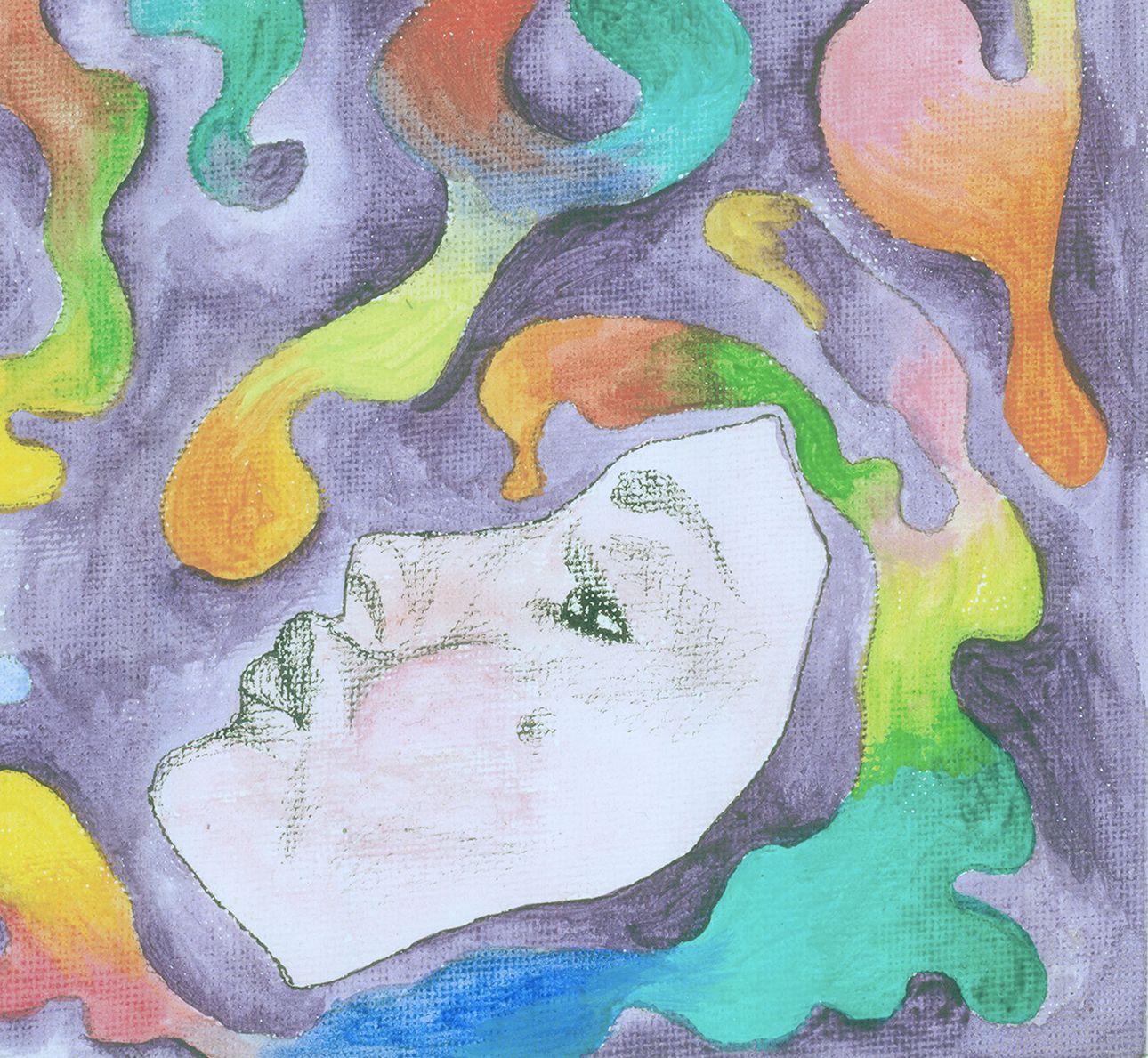
I’m not at the end of my journey, but this isn’t the beginning, either. Life finds a way of building together little steps we can take — little steps that change our world. I was lucky to have a supportive family, a supportive network of friends, and a very forgiving work environment while I navigated these changes. I know not all are so lucky. My story is not unique, but it is who I am. I’m a lesbian, and it’s not something to endure. It’s something that I may finally be able to forgive myself for — something I may finally be able to be proud of, and celebrate.
Through my journey of coming out as a late-in-life lesbian, I have gained useless insights about the LGBTQ+ community and the impact of allyship. It is essential to note that the following reflections are based on my personal experiences and do not claim to represent the entire lesbian community. I was unable to get the stamp of approval from The Committee of Lesbians for this article, as our monthly meeting was scheduled after Tumbleweird’s deadline.
Shit people say
(Don’t worry… some of it is good shit.)
“Everyone is just so proud of you.”
I receive congratulations and placations from everyone I encounter, to the point where it is sickly sweet. It usually goes something like this:
“How's your husband?”
“I’m not sure; we’re separating.”
“Oh no! Why?”
“Because I’m a lesbian.”
“Oh my god, good for you! Congrats! That must be so nice!”
No; the slow crumbling of my marriage was not nice. It is not something to be excited about. The excessive show of pride from others is incredibly overwhelming. My life is in a period of mourning, and all I receive is congratulations. Even my closest friends began planning a coming out party while I not so silently struggled with the emotions I was feeling.
How to be a better ally
Be conscious of people’s experiences. Not everyone who comes out needs to be drowned in empty platitudes about how proud you are of them. Get stock of their situations. You don’t congratulate someone who just found out they had cancer, or who broke their leg. You offer words of encouragement, and sympathy, focusing on the positive of finally knowing what’s wrong while acknowledging the road will be long. The road to learning yourself is also long, and not often as life threatening as a terminal illness. But for many of us, the future is still uncertain. Being a member of the LGBTQ+ community is something we’ve been taught we need to be proud of, but for some, the realization of coming out means that they have a long, hard road of strife in front of them.
“Did you always know?”
In the media, it’s often portrayed that people know from an early age that they’re different in some way, and they find the LGBTQ+ community at some point in their teens. In the last three years, I’ve spoken with a lot of women who came out later in life. They didn’t know they were a lesbian until they were in their late teens or early twenties. Sexuality is a journey and can always evolve. With the pressure put on women in our society, whether directly or indirectly, we are destined for a life of compulsory heterosexuality (perhaps with spicy straight sprinkles on top). I find the women who defy this mold incredibly powerful, intimidating badasses.
How to be a better ally
Normalize change. Encourage a forward-thinking vision of the future. Embrace the knowledge that people don’t always have the words or the personal strength to live their life authentically from the beginning. That’s okay, and we need to give realistic hope that things can change.
“We’re with you! No, really… we’re ALWAYS with you.”
Allies are everywhere. Every LGBTQ+ space has them, and I genuinely appreciate the advocacy and support they provide for the LGBTQ+ community. But I’ve found that there are zero online spaces that are specifically for members of the community, and I have yet to find a single place in person that is by the community, for the community (outside of the Rainbow Connection’s Monday night support group). At one local group I attended, the struggles and triumphs of a straight mother with a trans child took precedence over the experiences of the LGBTQ+ individuals who had come there for support.
How to be a better ally
Allyship is valuable, but allies need to remember their experiences and hardships should not dominate the conversation, either in online messages or in person. Simply knowing, being related to, or being affected by someone else’s membership in the alphabet mafia does not grant you authority to speak on those topics. This goes double in spaces where there are members of the community present, specifically in our local Facebook groups and in-person meetings. Let the LGBTQ+ community speak for themselves in spaces that are for them. If you want to be allies, stand up for us when you’re in spaces where we aren’t always welcome — your work meetings, your Thanksgiving dinners, your family reunions.
“I can’t call you a… a lesbian…”
The word 'lesbian' carries significant challenges and controversies, but it is not a bad word! Over the past three years, I've become acquainted with the existence of TERFs (Trans Exclusionary Radical Feminists) or, as I prefer to call them, 'fuckwits.' Additionally, I've encountered the concept of political lesbianism. Simply identifying as a lesbian has exposed me to ridicule from within the LGBTQ+ community itself, and to accusations of not accepting trans women or nonbinary individuals. The extent of gatekeeping surrounding the definition of 'lesbian' is truly baffling. Personally, I believe these issues stem from sexism and the prevalence of online interactions.
How to be a better ally
Use the word ‘lesbian’ without hesitation when referring to people who identify as such. Stop using other terms that you deem more ‘acceptable’. Embrace the word: Lesbian. It is not a derogatory or shameful word. It isn’t a dirty word. Use it. By using it confidently and respectfully, we can challenge the stigma and contribute to a more inclusive understanding of lesbianism.
Of course this goes for other members of the alphabet mafia, as well. Respect people by using the identifiers they choose — not the ones you’re most comfortable with. Remember that allyship isn’t about you!
“Why do you hate men?”
We are not ‘non-men loving non-men’. We don’t care about men. Men have nothing to do with this. It is crucial to understand that our focus is on women loving women, including agender and non-binary individuals. We are people loving people. We don’t think about men; they don’t enter the picture at all.
How to be a better ally
This is undoubtedly a challenging aspect to address. We live in a patriarchal society where any deviation from male centrality is often met with commentary. It is essential to reject the notion of man-hating lesbians, as I have yet to encounter a single lesbian who spends their days thinking about men. Their presence is simply irrelevant to our identities and relationships. By challenging and shutting down the unfounded commentary, we can strive to shift the narrative and dispel the misconception that lesbianism is in any way connected to men.
“Shouldn’t you be willing to include everyone?”
It has been an eye-opening experience for me to witness how lesbians are often targeted and criticized, especially within our own LGBTQ+ community. When I realized there were no local spaces for lesbians, I took the initiative to create one. However, I immediately faced backlash for supposedly excluding bisexual women and was questioned about defining lesbianism and womanhood. My intention was never to erase or invalidate the experiences of bisexual individuals; I simply desired a dedicated space for lesbians to connect with one another. The tension and criticism I encountered were most prominent from within our own community.
How to be a better ally
We must address the issue of gatekeeping, particularly among members of the LGBTQ+ community. Sexuality, by its very nature, is exclusionary. This doesn’t create erasure or dismissal of anyone else's experiences. It is perfectly acceptable to have specific attractions and to create specific spaces and terminologies for those who share those relationship models. Each individual's unique experiences and identities can coexist without negating one another. Sexuality and attraction is not a zero sum game.
“Good thing you’re finally out!”
Coming out is not a one-stop-shop. You don’t ‘come out’ all at once and then you’re done sharing your journey. You come out to your husband of 15 years and watch your marriage crumble in your hands. You come out to your parents, your siblings, your bosses, your friends. You come out to yourself. You come out to the checker at the grocery store when you’re in line with your partner. You come out to people from your past when you run into them and they ask how things are. You come out every day, every time you interact with someone new.
How to be a better ally
Let's shift the focus away from glorifying the idea of a single, beautiful coming out moment. Instead, let's normalize conversations about everyday experiences of coming out, such as sharing what it's like to disclose your identity to the cute woman at the coffee shop or introducing your wife at an office party. It's important to discuss and acknowledge the realities of coming out as they exist in real life, rather than adhering to idealized portrayals found in movies and other media.
“Oh goody! I have a gay friend!"
Coming out seems to make people think you’re automatically an expert on all things queer. Every straight person in your life has questions, and you, their new token lesbian, can answer them. “Why do gay men sound like that? And what’s with all the plaid?” I don’t know. I’m just one lesbian woman. I have no authority here and I want none. I’m just a person.
How to be a better ally
Use Google. Don’t corner the LGBTQ+ people in your life and treat them like a gay encyclopedia.
“You have a new community.”
Like every community, the LGBTQ+ community has problems (which I am obviously very salty about). But, people are people, and in a one-on-one situation, most of them are fantastic. They are beautiful, loving, and full of care. I have never in my life felt as much a part of something bigger than myself as I do now.
How to be a better ally
Don’t try to fix anything. The local Tri-Cities LGBTQ+ community, despite its imperfections, is wonderfully beautiful. If you've been contemplating joining, now is the perfect time to take that step and become part of this vibrant community.
“The future may be brighter, but it is also uncertain.”
Living for years as a shadow of myself left the world incredibly sepia-toned. Every day was a slog; every night was spent dreading the consciousness of tomorrow. Things are so much better now. Trust me — once you take the necessary steps to accept the loss of your current life (and the future you once envisioned for yourself), you can begin to have so much more.
How to be a better ally
Unfortunately, anti-trans legislation is being introduced across the country, and even neighboring states are threatening gender-affirming care for our cousins. While we may live in a western country, it's important to remember that the sweeping legalization of same-sex marriage occurred only in the last decade. This progress is still new and fragile, and there is always the potential for things to worsen.
Allyship is a cornerstone of helping LGBTQ+ people navigate an oppressive world. As the world changes, and more and more people are coming to terms with their sexuality and gender nonconformity (hello, Gen Z!), the roles of allies must change, too. Let us celebrate the progress we have made together, as both allies and community members, while remaining vigilant and committed to protecting and advancing LGBTQ+ rights.
Cheyenne is a much too frequent meddler who can't stay in her own lane… metaphorically. https://linktr.ee/cheysummer
